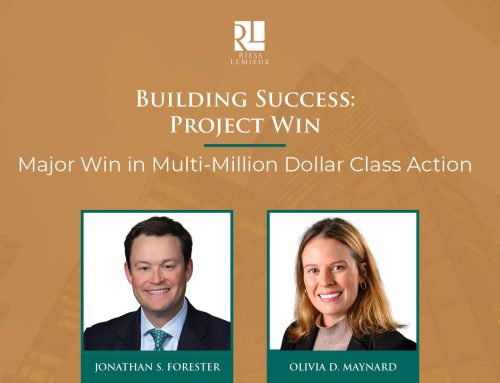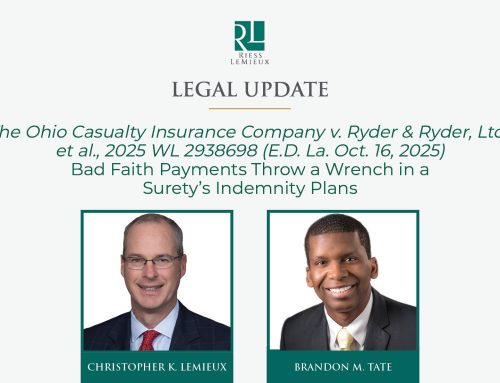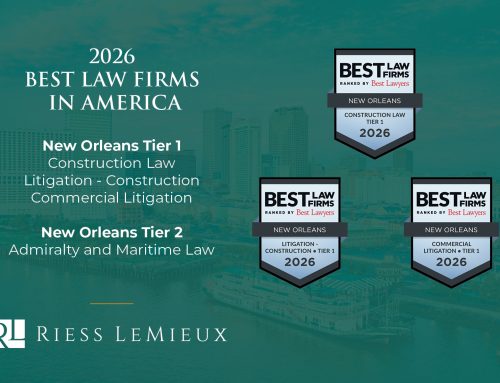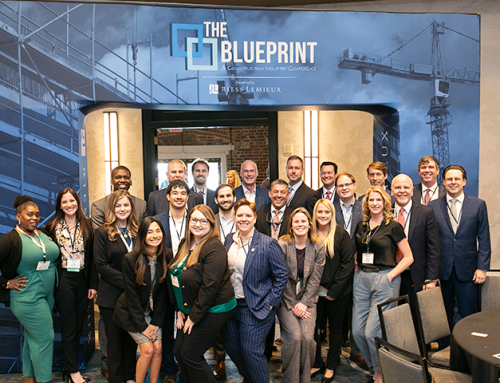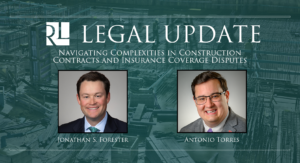 Crescent City Remodeling LLC v. CMR Construction and Roofing LLC – Navigating Complexities in Construction Contracts and Insurance Coverage Disputes
Crescent City Remodeling LLC v. CMR Construction and Roofing LLC – Navigating Complexities in Construction Contracts and Insurance Coverage Disputes
Authors: Jonathan S. Forester and Antonio Torres
Background of the Dispute
In Crescent City Remodeling LLC v. CMR Construction & Roofing LLC, the U.S. District Court for the Eastern District of Louisiana was tasked with adjudicating a contractual dispute arising out of post-Hurricane Ida remediation efforts. The litigation involved Crescent City Remodeling LLC (“Crescent”) and CMR Construction & Roofing LLC (“CMR”), and stemmed from a disagreement over unpaid fees for services performed on Tangipahoa Parish School Board buildings.
Crescent initiated the lawsuit, asserting that CMR failed to compensate it for the work completed under the parties’ joint work agreement. CMR responded with a counterclaim, alleging that Crescent had breached the contract by failing to provide adequate supervision, hiring unqualified personnel, and performing substandard work. CMR claimed that Crescent’s failures resulted in financial losses, including lost revenue, withheld payments from the School Board, and additional costs incurred in addressing Crescent’s alleged deficiencies.
A central issue in the case was CMR’s third-party claims against Crescent’s insurer, Next Insurance US Company (“Next”). CMR contended that Next was liable for covering the claims CMR brought against Crescent, arguing that the commercial general liability policy issued by Next to Crescent extended to the claims at hand.
In response, Next filed a motion for summary judgment, asserting that the claims were beyond the scope of the policy’s coverage. Next argued that the policy did not cover the economic losses or breach of contract claims asserted by CMR; and, moreover, even if CMR’s damages could be construed as property damage, Next contended that the policy’s Fungi Exclusion and Designated Ongoing Operations Exclusion provisions precluded coverage.
Court’s Ruling
On August 26, 2024, the Court granted Next’s motion for summary judgment, agreeing with Next that the insurance policy did not cover the economic losses and breach of contract claims asserted by CMR. The Court found that Next had demonstrated a lack of evidence supporting any claim of physical damage to property, thereby shifting the burden to CMR to present evidence establishing a genuine issue of material fact, which CMR failed to do.
CMR argued that Crescent’s “mistimed and poorly executed remediation work” necessitated corrective actions and additional labor, but the Court held that CMR’s assertions failed to prove that any actual property damage had occurred. Instead, the Court found that CMR’s claims merely illustrated that Crescent’s substandard work required CMR to complete the work itself, resulting in additional expenses. In the absence of proof of physical damage, the Court examined whether the alleged economic losses constituted a “loss of tangible property” covered under the terms of the policy.
Relying on well-established Louisiana jurisprudence, the Court ruled that the damages claimed by CMR did not qualify as property damage under the policy. The Court held that costs related to redoing remediation work due to poor initial performance failed to satisfy the policy’s property damage provision unless there was evidence that the work caused harm to the property itself. In this case, the lack of evidence showing actual property damage precluded CMR’s claims.
Additionally, CMR’s argument that a specific risk-loss analysis was required for pure economic loss cases was similarly unpersuasive. The Court concluded that such an analysis was irrelevant, as no tort claims had been brought against Next.
Finally, the Court concurred with Next’s argument that even if the damages had otherwise been covered under Crescent’s policy, the Fungi or Bacterial Exclusion would still have precluded recovery. Upon reviewing the joint work agreement, the Court noted that Crescent’s responsibilities were confined to coordinating and managing tasks such as “pack out, demo, and spraying of disinfectant,” as well as overseeing subcontractors for services like environmental reporting and certification. The Court determined that these activities fell squarely within the policy’s exclusions, which explicitly state that the insurance does not apply to “[a]ny loss, costs or expenses arising out of the abating, testing for, monitoring, cleaning up, removing, containing, treating, detoxifying, neutralizing, remediating or disposing of, or in any way responding to, or assessing the effects of, ‘fungi’ or ‘bacteria,’ by any insured or any other person or entity.” As a result, no coverage was available for the costs associated with these activities.
Conclusion
In Crescent City Remodeling LLC v. CMR Construction & Roofing LLC, the U.S. District Court for the Eastern District of Louisiana decisively ruled in favor of Next Insurance US Company, granting its motion for summary judgment. The Court determined that CMR’s claims for economic losses and breach of contract against Crescent were not covered by Crescent’s commercial general liability policy with Next. The ruling underscored that CMR’s allegations, which centered on Crescent’s substandard performance, failed to establish any actual physical damage to property—a key requirement for triggering coverage under the policy’s property damage provision.
Moreover, the Court found that even if CMR’s claims had met the threshold for property damage, the policy’s Fungi Exclusion and Designated Ongoing Operations Exclusion would have independently barred recovery. The Court emphasized that Crescent’s contractual obligations, which involved remediation activities such as disinfectant spraying and environmental management, fell squarely within these exclusions.
Ultimately, the Court’s decision reinforced the principle that commercial liability insurance does not extend to cover purely economic losses or claims arising from poor workmanship, absent tangible property damage. However, what it also does is confirm that economic losses may be covered when there is also actual damage that is covered. Thus, clearly pleading actual, covered resulting damage from defective work in a lawsuit could serve to also cause resulting economic losses to be covered.
For more information on navigating construction contract disputes or understanding insurance coverage limitations, please contact our legal team for expert guidance.
